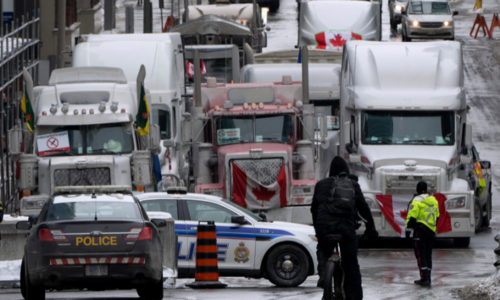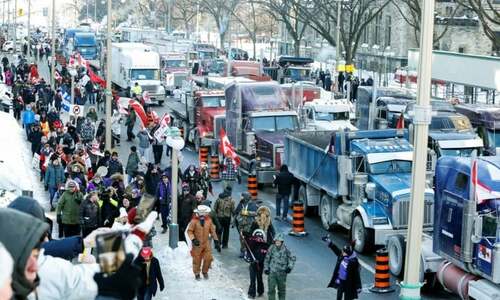OTTAWA: Ontario’s premier announced on Monday that Canada’s most populous province will lift its Covid-19 proof-of-vaccination requirements in two weeks not because of the protests that have blocked the border and paralyzed Ottawa, he said, but because it is safe to do so.
The busiest US-Canada border crossing, meanwhile, was open again on Monday after police removed the last of the protesters who had bottled up the Ambassador Bridge for nearly a week in a demonstration against Canada’s virus restrictions. But the larger truck-borne protest in the capital, Ottawa, persisted as city residents seethed over authorities’ inability to reclaim the streets.
Ontario Premier Doug Ford said that on March 1, the province will drop its requirement that people show proof of vaccination to get into restaurants, restaurants, gyms and sporting events. A surge of cases caused by the omicron variant has crested in Canada.
The province will also remove its 50pc capacity limit on restaurants on Thursday, four days earlier than planned. Ford gave no timetable for dropping the requirement that people wear masks in public places.
Let me very clear: We are moving in this direction because it is safe to do so. Today’s announcement is not because of whats happening in Ottawa or Windsor but despite it, Ford said.
Ford said he would support Prime Minister Justin Trudeau’s government if it proposed further measures to quell the protests.
We need law and order. Our country is at risk now. Its not just not happening here in Ottawa, but its happening in Alberta and British Columbia, Ford said. We wont accept. it Trudeau planned to meet virtually with the leaders of Canada’s provinces on Monday morning, as well as with lawmakers.
The prime minister has so far rejected calls to use the military but has said all options are on the table to end the protests, including invoking the Emergencies Act, which gives the government broad powers to quell unrest. Trudeau has called the protesters a fringe of Canadian society. Both federal and provincial politicians have said they cant order police what to do.
Nelson Wiseman, a political science professor at the University of Toronto, said the army should have been deployed after a week of the Ottawa occupation.
Not invoking it led to the blockade at the Ambassador Bridge and at the Manitoba-North Dakota border. Protesters there believed that the police would not or could not act, Wiseman said.
An earlier version of the Emergencies Act, called the War Measures Act, was used just once during peacetime, by Trudeau’s late father, Prime Minister Pierre Trudeau, to deal with a militant Quebec independence movement in 1970.
Published in Dawn, February 15th, 2022















































